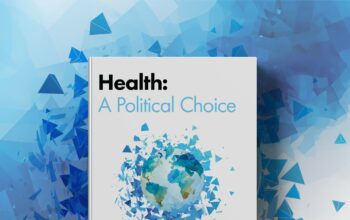COVID-19: Finding a vaccine in record time
This article was originally published in French in AGEFI on March 3, 2020.
Before it first emerged in December, the COVID-19 virus was unknown. Just a month later, the sharing of this new virus’s genome within the scientific community swiftly enabled researchers to set in train the initial stages of research and development (R&D) designed to find a vaccine that protects us from this novel coronavirus.
R&D biopharmaceutical companies have mobilized their researchers, reviewing their priorities in order to free up their teams and set them to work on the COVID-19.
Experts agree that we will have to learn to co-exist with this virus, as it is not going to disappear any time soon. This is why it is essential to focus on developing a vaccine. Fortunately, we are not starting from scratch. At least four biopharmaceutical company laboratories, members of the IFPMA, have begun research on a vaccine. The 2003 SARS (Severe Acute Respiratory Syndrome) epidemic enabled advanced technologies to be developed that can be adapted to the COVID-19.
We can count on strong cooperation from the scientific community. Some R&D biopharmaceutical companies have built partnerships with networks such as CEPI (Coalition for Epidemic Preparedness Innovations), an organization created following the Ebola epidemic, that are designed to encourage collaboration with researchers working in biotech companies or in universities. One such deal was also signed with IMI (Innovative Medicine Initiative), a European public-private partnership funding health research and innovation.
The race for developing a vaccine against Ebola forged a new form of close collaboration between authorities and biopharmaceutical companies to speed up regulatory processes, clinical trials, and obtain the required licenses. However, developing a safe and effective vaccine and producing it in sufficient quantities to protect thousands, nay millions, of people will take time even so. Indeed, once any authorization for marketing the vaccine has been granted, companies have then got to produce it on an “industrial” scale.
In normal times, this process of developing a new vaccine from scratch could take ten years or more. Thanks to an unprecedented collaboration between private and public stakeholders, these timescales will be shortened. Even so, any announcement that a vaccine will be ready two or three months from now will have to be subjected to very careful scrutiny.
First tests on human subjects may well take place but much more time will be required before you and I are vaccinated against COVID-19.
Still, one thing is certain: vaccination remains the most effective solution to protect the population and tackle the challenge this novel coronavirus poses. The emergence of COVID-19 will, I hope at least, re-inspire trust in vaccines in Switzerland.
Thomas Cueni, General Director, International Federation of Pharmaceutical Manufacturers and Associations (IFPMA)
Before its appearance in December, the COVID-19 virus was unknown. Just a month later, sharing the genome of this new virus within the scientific community has enabled researchers to quickly start the very first stages of research and development to find a vaccine that can protect us from this new coronavirus.
Biopharmaceutical companies have mobilized their researchers and reviewed their priorities to free up their teams and let them work on the COVID-19.
Experts agree that it will be necessary to learn to live with this virus and that it is not ready to disappear anytime soon. This is why it is essential to work on developing a vaccine. Fortunately, we are not starting from scratch. At least four IFPMA member pharmaceutical companies have started research on a vaccine. The SARS (Severe Acute Respiratory Syndrome) epidemic in 2003 enabled the development of advanced technologies that can be adapted for COVID-19.
We can count on strong cooperation from the scientific world. Some pharmaceutical companies have signed agreements with networks such as CEPI (Coalition for Epidemic Preparedness Innovations), an organization created following the Ebola epidemic, to facilitate collaboration with researchers working in biotech companies or universities. . An agreement has also been signed with the European public-private research partnership (IMI – Innovative Medicines Initiative).
The race to develop an Ebola vaccine has also forged a new way of working closely with authorities and biopharmaceutical companies to accelerate regulatory steps, clinical trials, and obtain licenses. But developing a safe and effective vaccine and producing it in sufficient quantities to protect thousands or even millions of people will still take time. Because once a possible marketing authorization has been obtained, companies must produce vaccines on an “industrial” scale.
Normally, this process to develop a vaccine from scratch can take ten years, even longer. Thanks to an unprecedented collaboration between private and public actors, deadlines will be reduced. But, it will be necessary to scrutinize the declarations announcing that a vaccine will be available within two or three months.
Initial studies in humans may well take place, but it will take much longer before you and I are vaccinated against COVID-19.
But one thing is certain: vaccination remains the most effective solution to protect populations and meet the current challenge posed by the emergence of this new coronavirus. The appearance of COVID-19 will perhaps, at least I hope, promote a renewed confidence in vaccines in Switzerland.
* Thomas Cueni, Director General, International Federation of the Pharmaceutical Industry
Author






